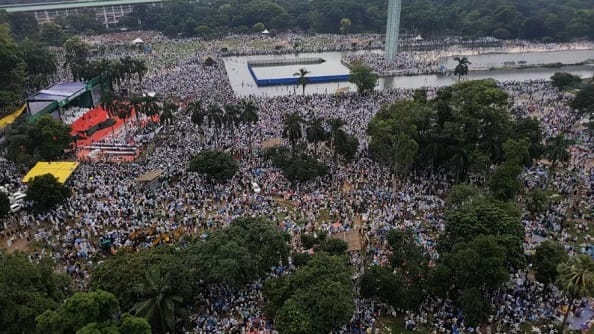Last Updated on July 19, 2025 7:02 pm by INDIAN AWAAZ
Zakir Hossain / Dhaka
Bangladesh’s main opposition party, the Bangladesh Nationalist Party (BNP), has rejected the proposed proportional representation (PR) voting system for a future upper house of parliament, vowing to resist any attempt to impose it. The decision came during recent meetings of the party’s standing committee, attended virtually by acting chairman Tarique Rahman.
The PR model, backed by Islamist party Jamaat-e-Islami and several others including Islami Andolan Bangladesh and the student-led National Citizen Party (NCP), has become a major point of contention in ongoing political dialogues led by the National Consensus Commission. The commission has recommended forming the upper house based on vote share.
BNP, while supporting the creation of a bicameral parliament in its 31-point reform proposal, insists that the upper house should consist of distinguished citizens—not politically selected nominees. A senior BNP leader argued that with no provincial structure in Bangladesh, the PR system was unnecessary and potentially a political tool. “Creating another chamber and increasing state expenditure raises public concerns,” the leader said.
The debate over the PR system gained urgency after Jamaat-e-Islami held a massive rally on Saturday at Dhaka’s Suhrawardy Udyan—its first at the historic site since 1971. The party, once sidelined, has re-emerged following the ouster of former Prime Minister Sheikh Hasina last August. Jamaat demanded PR voting, justice for past mass killings, and implementation of last year’s “July Uprising” charter. “Our goal is a new Bangladesh where Islam will guide governance and corruption will end.” Party leaders, joined by supporters from across the country, outlined a seven-point demand to the interim government, including trials for killings, structural reforms, and electoral rights for expatriates.

Jamaat-e-Islami rally in Dhaka
BNP Secretary General Mirza Fakhrul Islam Alamgir warned the interim government against delaying reforms and elections. Speaking at Dhaka’s Jatiya Press Club, he urged dialogue among parties to resolve differences. “We don’t want power through revolution—we want a democratic mandate,” Fakhrul said. “Our Liberation War is non-negotiable. Democracy must be restored.”
Responding to political tensions, Chief Adviser Muhammad Yunus’ Press Secretary Shafiqul Alam reaffirmed that elections will proceed as scheduled, likely in April 2026. “There’s no uncertainty. A level playing field will be ensured,” he said, adding that the PR system remains under serious discussion among parties. He also addressed recent violence during the NCP rally in Gopalganj: “The law is being applied equally. Those responsible for unrest are being arrested.”
